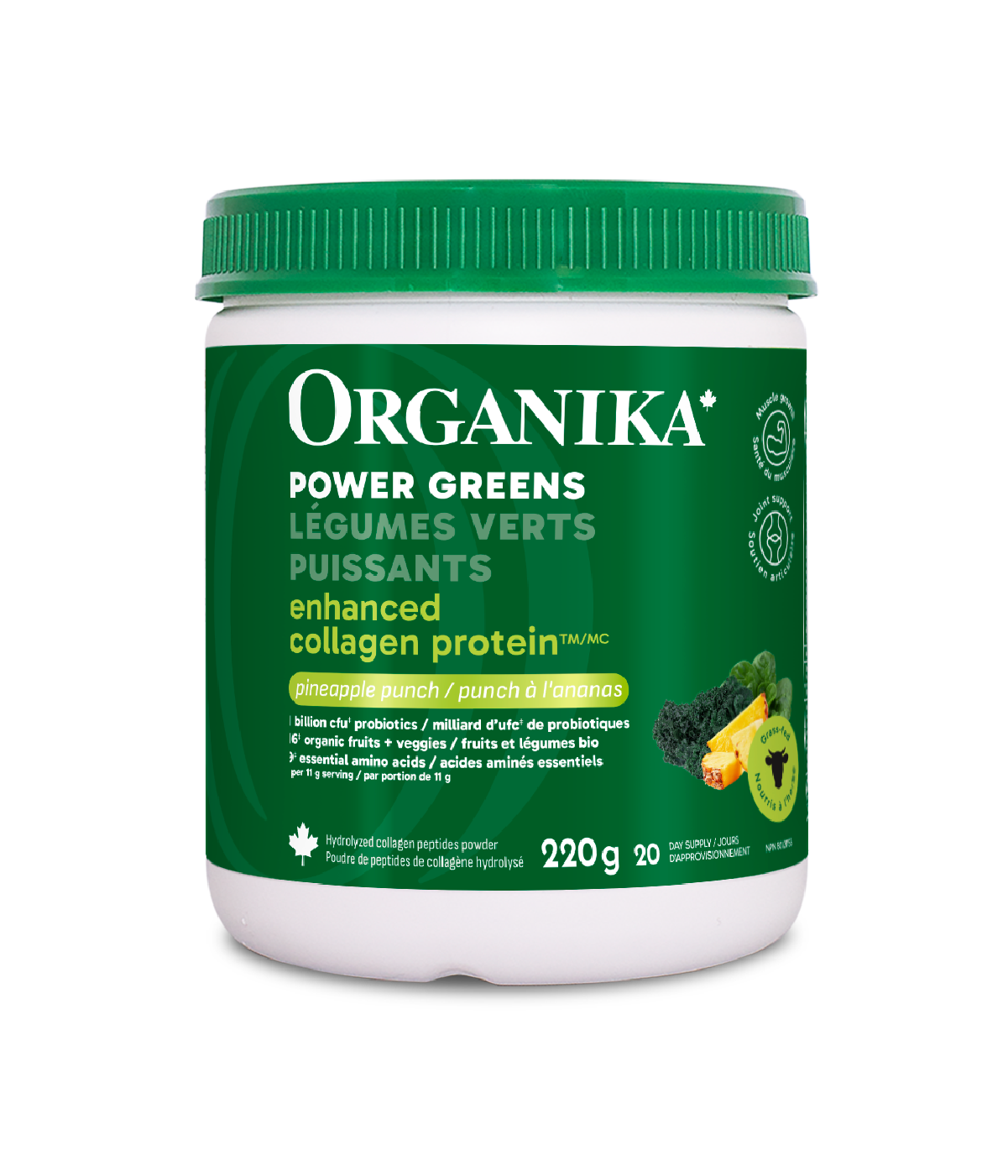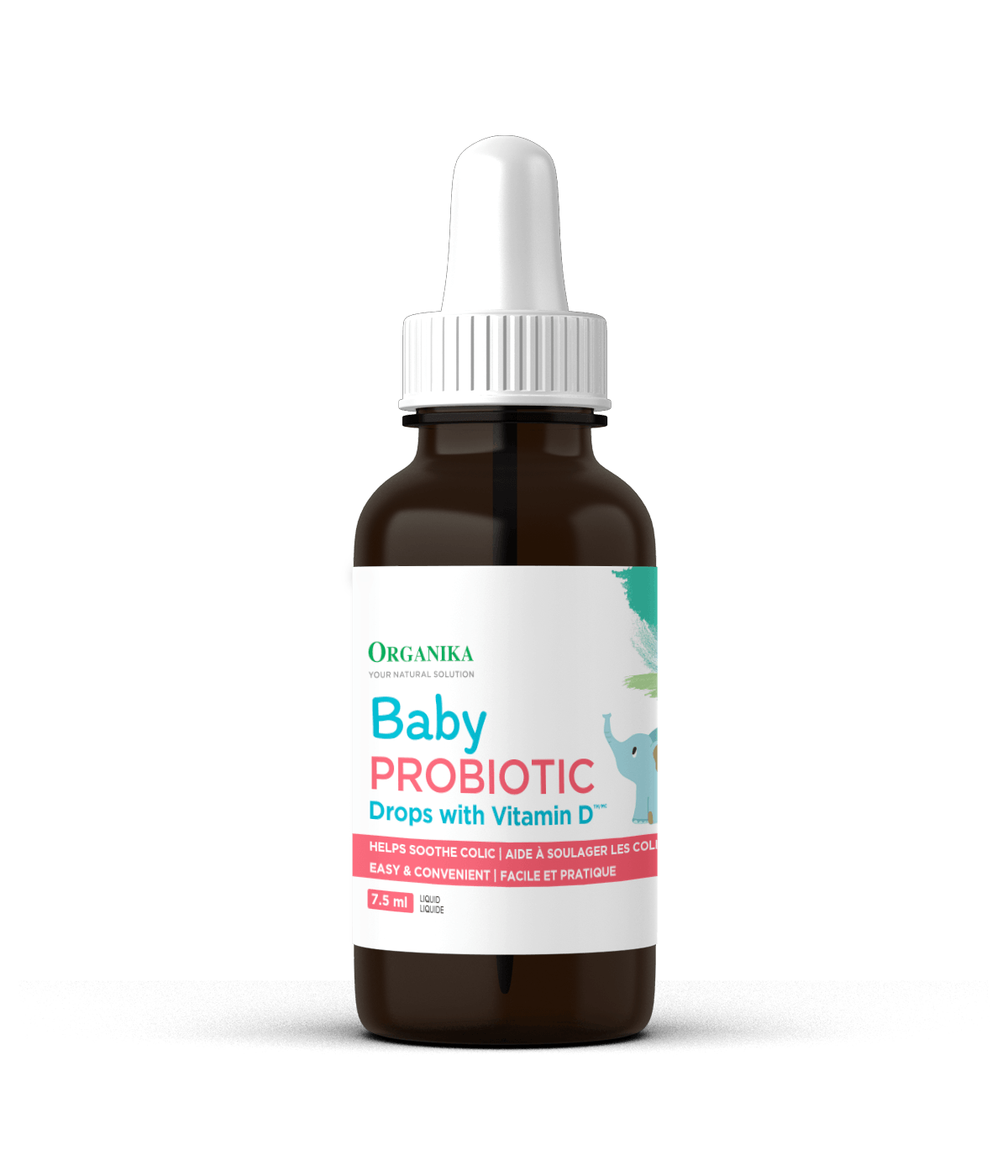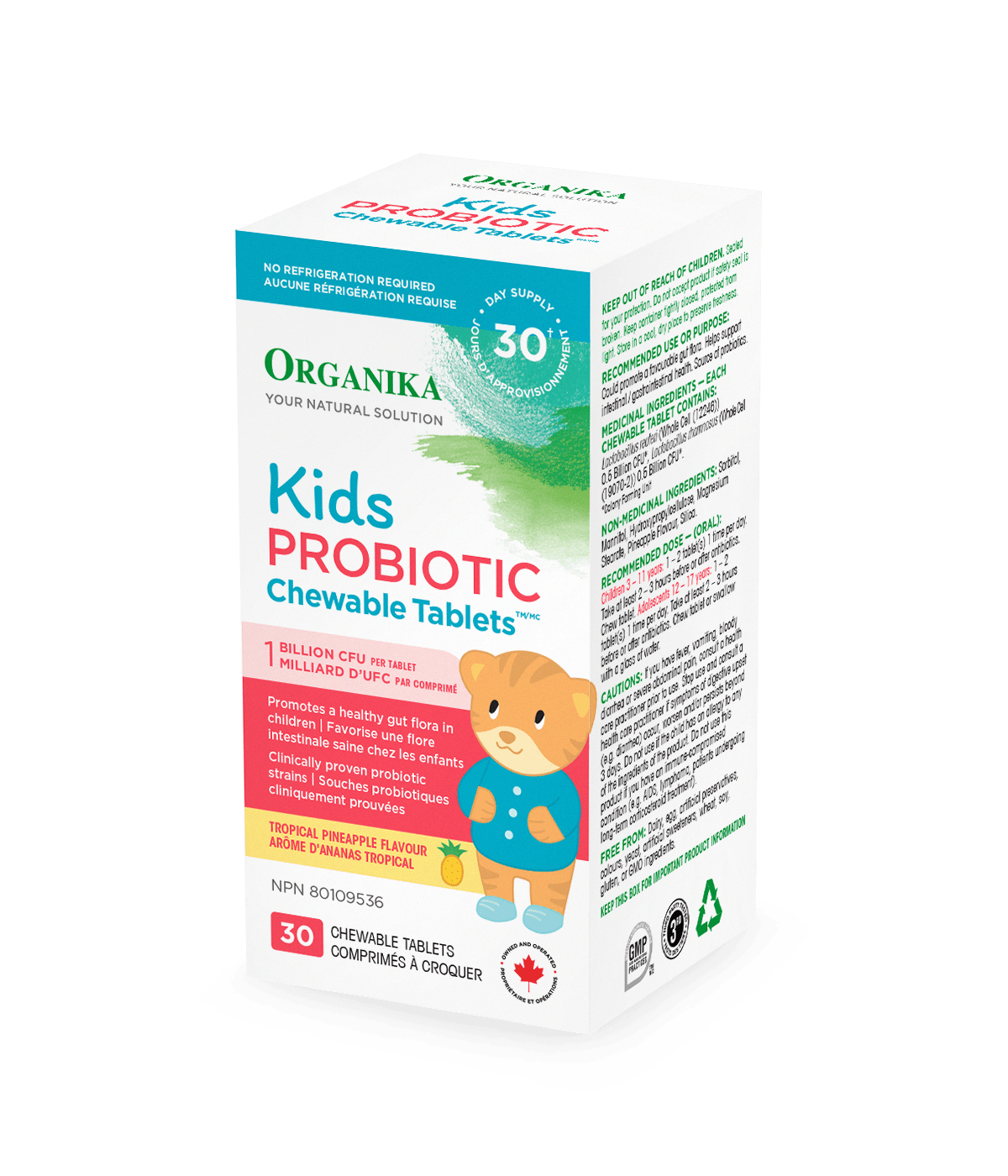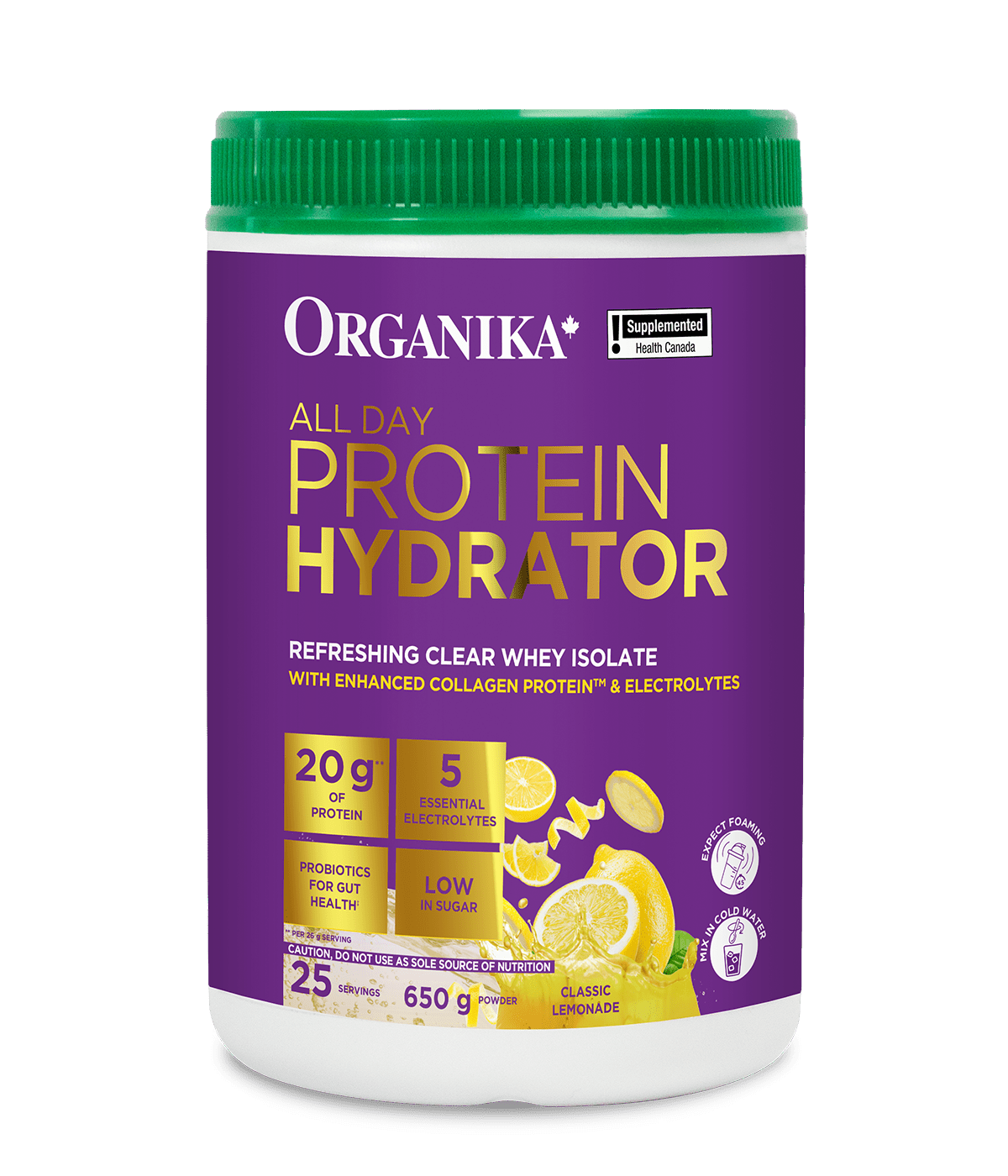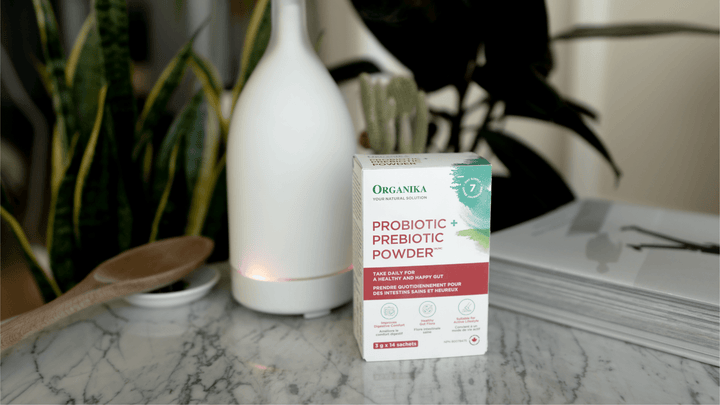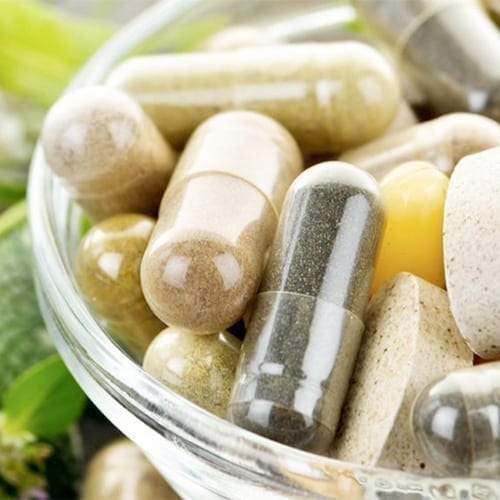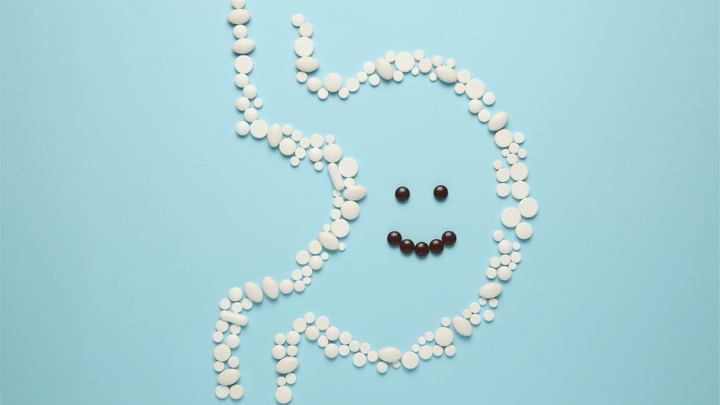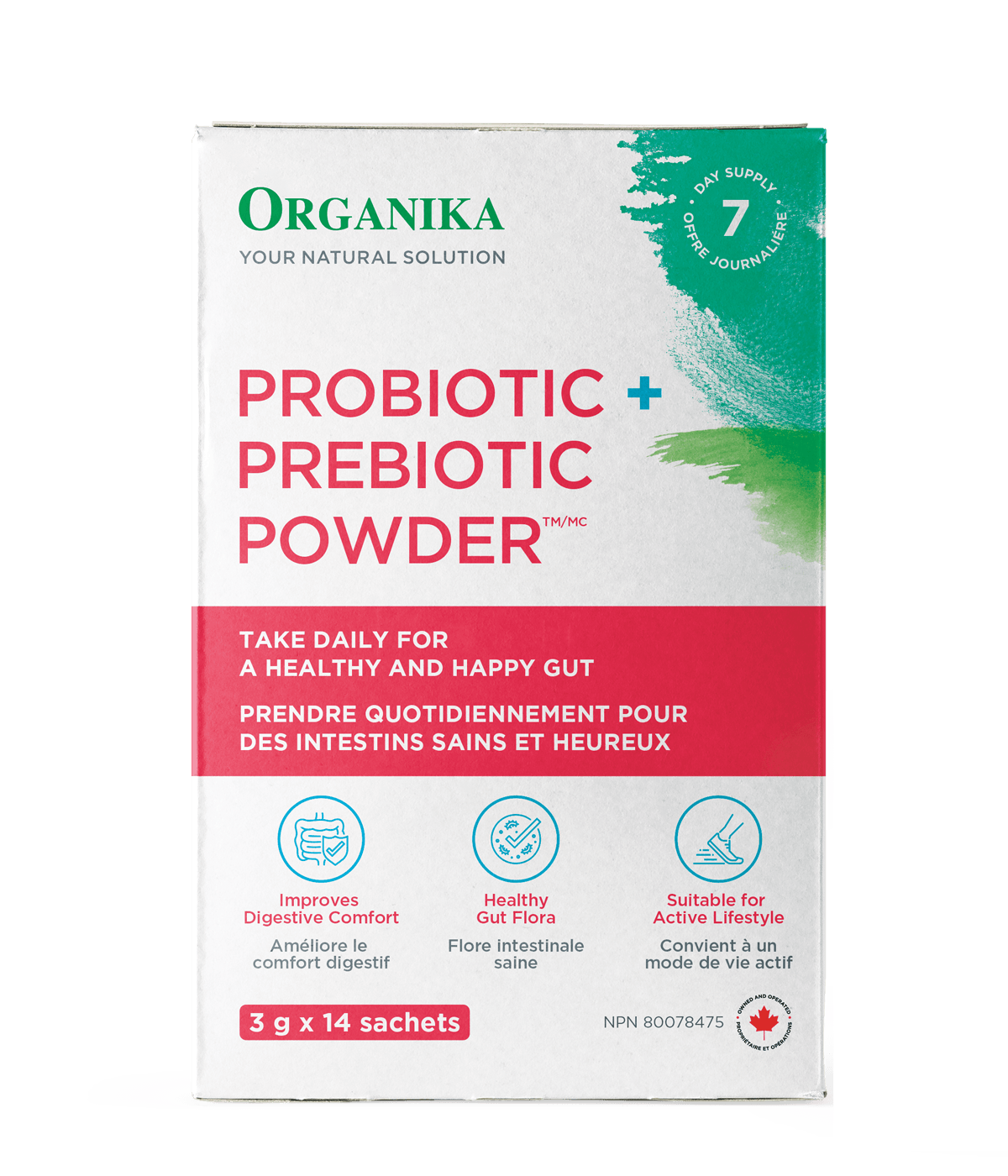
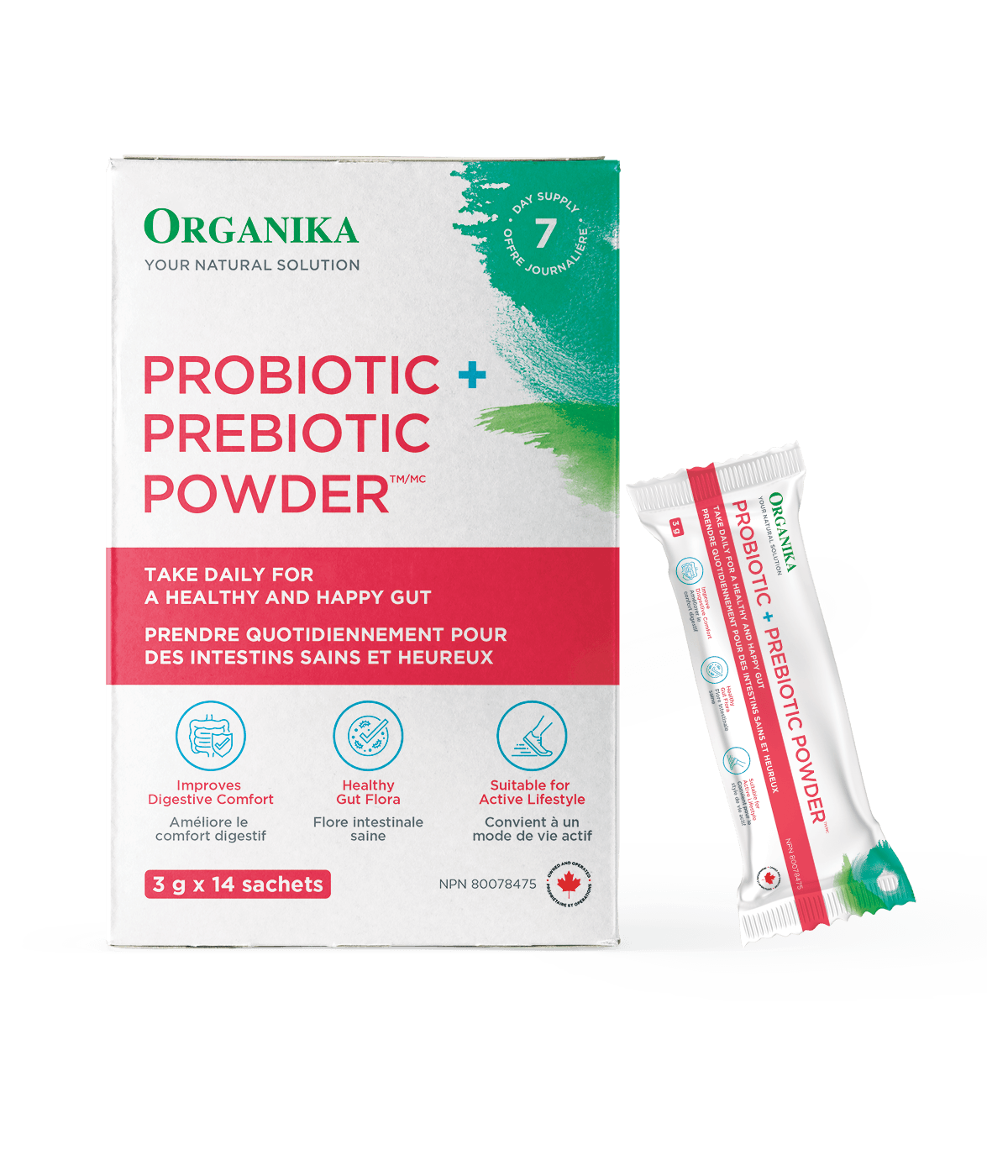




-
Is this right for you?

-


-


-

Probiotic + Prebiotic Powder
Help your gut flourish
- Supports gut and digestive health in a shelf-stable powder
- Helps maintain a healthy, balanced intestinal flora
- Helps support regularity
- Source of fibre
Couldn't load pickup availability


Buy in Bundle & Save

Notify Me When Available
Enter your email and we'll let you know as soon as this product is back
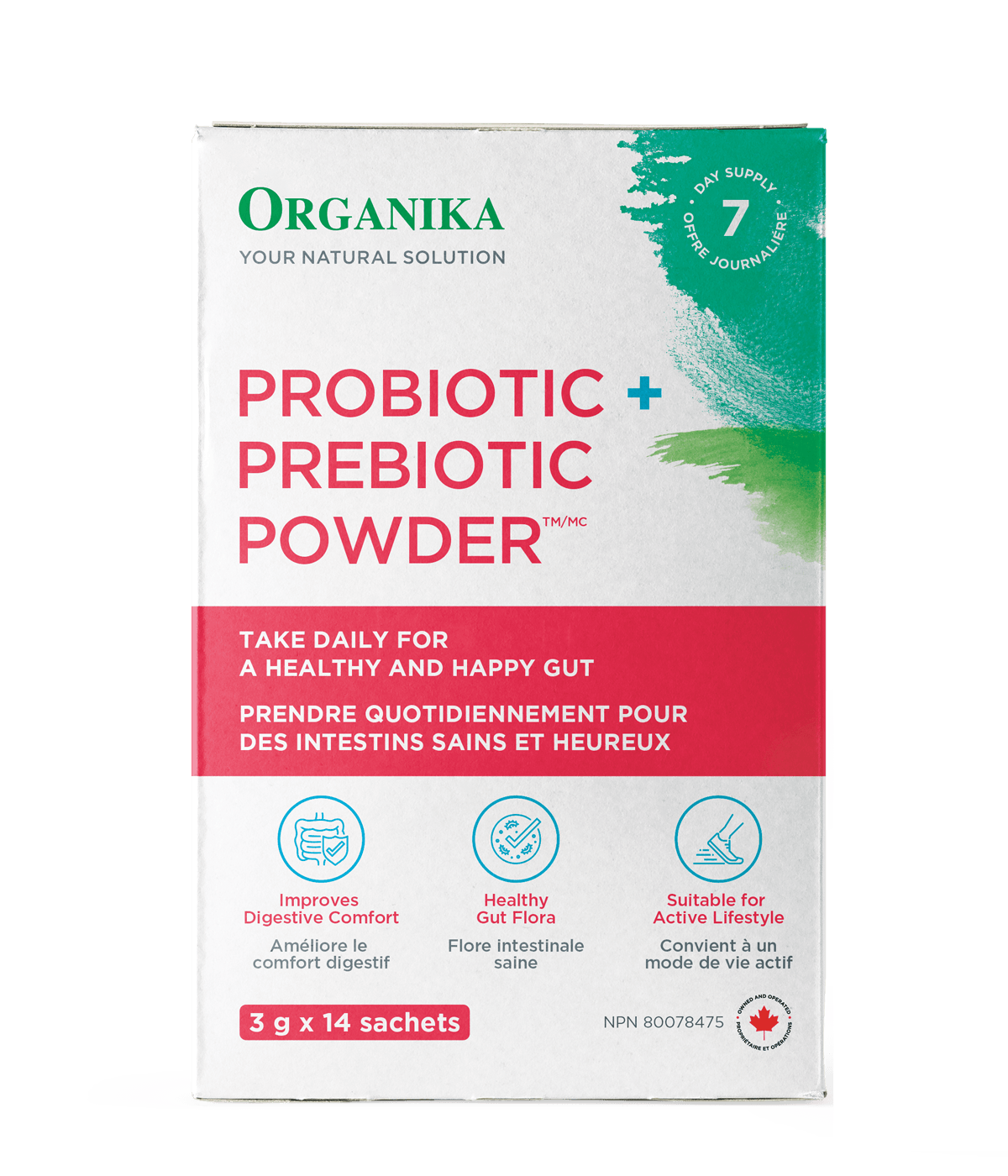
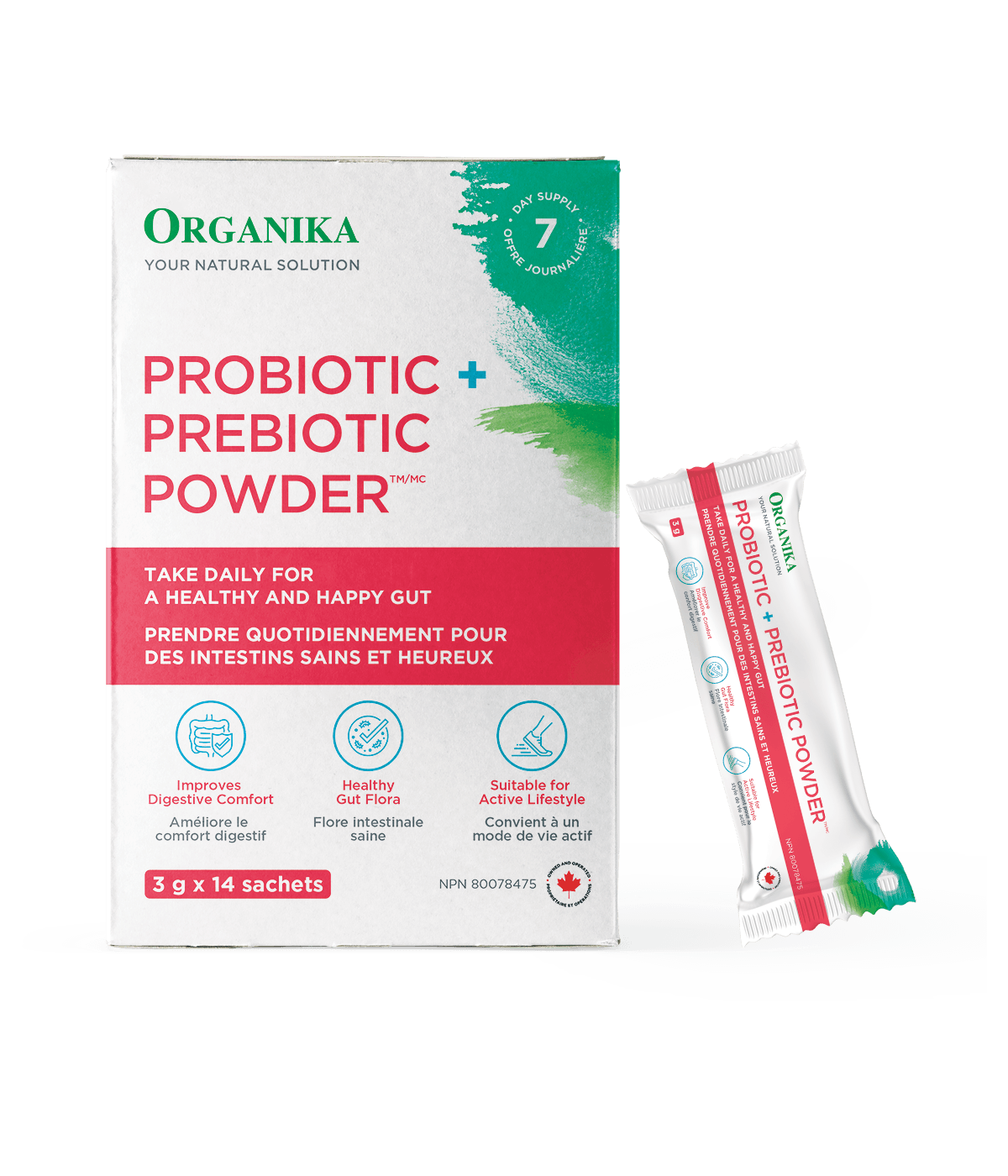


Supplement Facts


Ingredients & Nutrition
MEDICINAL INGREDIENTS: Each Sachet Contains: Bifidobacterium animalis subsp. lactis (Whole Cell (SD-5220)) 100 Million CFU*, lactobacillus acidophilus (Whole Cell (B-3208)) 100 Million CFU*, Bifidobacterium bifidum (Whole Cell (SD-5215)) 25 Million CFU*, Bifidobacterium longum subsp. longum (Whole Cell (SD-5588)) 25 Million CFU*, Actilight Prebiotic Fibre / FOS (Beta vulgaris) (Root) 2 500 mg *Colony Forming Unit
NON-MEDICINAL INGREDIENTS: D-Fructose, Orange Flavour, Silicon Dioxide.
How to Use: Take it with water or on its own: just sprinkle, let melt, and go! Take 2 times a day. If you are taking antibiotics, take 2-3 hours before or after. Take for a minimum of 6 weeks to see beneficial effects on mild functional bowel disorders.
Is This Right for You?
Curious if your gut is as balanced as it could be?
Want a simple way to support digestion and feel more at ease?
Looking for an easy daily ritual to nurture your microbiome?
If you answered "yes" to any of the above, this product is right for you.

-
Helps support regularity
-
Source of fibre
Ingredients & Nutrition
Recommend For
Curious if your gut is as balanced as it could be?
Want a simple way to support digestion and feel more at ease?
Looking for an easy daily ritual to nurture your microbiome?
If you answered "yes" to any of the above, this product is right for you.
Gluten-Free
Non-GMO
Vegan Friendly
A daily blend of four clinically studied probiotic strains and prebiotic fibre to support digestive health and gut balance


The Full Scoop

-
Helps support regularity
-
Source of fibre
This gentle daily blend combines four clinically studied probiotic strains with Actilight®—a prebiotic fibre sourced from beetroot—to support a balanced gut. It's designed to nourish your microbiome from both sides: the probiotics introduce good bacteria, while the prebiotic fibre helps them thrive. Lightly sweet and naturally pleasant-tasting, our Probiotic + Prebiotic Powder mixes easily into your routine to help support digestion, keep things regular and promote a healthy gut environment.
Ask Away
We’ve got the FAQs covered. But if you’re still stuck, we’re only a message away.
Get in TouchDoes this product need to be refrigerated?
No. Organika's Probiotic + Prebiotic powder can be stored at room temperature. Just make sure to keep it under 25 °C. This makes it a great product to be taken on-the-go or for travellers.
Does it matter what strains are in a probiotic?
There are many different strains of probiotics, but research has shown that they don't all have the same effects. When purchasing probiotics, it is important to make sure it contains clinically-studied strains with proven benefits. Organika's Probiotic + Prebiotic powder's four probiotic strains are clinically studied and science-backed!
Isnít more bacteria better?
Different probiotics are effective at different levels. More does not necessarily mean better! The effective dose for any given probiotic depends on the strain used and is determined based on clinical studies. The strains used in Organika's Probiotic + Prebiotic powder have been clinically proven to work at the quantities used in our formula.
Are probiotics safe for pregnant/nursing women?
Yes, and in fact there is strong evidence that probiotic supplementation during pregnancy can improve newborns' immunity and decrease allergies. We recommend consulting a health care practitioner before starting any health program.
Do probiotics have side effects?
Probiotic may have mild, temporary side effects, usually in the form of minor digestive discomfort. Those are often part of the natural cleansing process (similar to detoxification reactions) and a sign that the probiotics are working.
You'll Likely Also Love...
Enhanced Collagen Protein Power Greens with Probiotics
A powerful whole-body booster to meet your daily nutritional needs
Baby Probiotic Drops With Vitamin D
A daily drop to support babies digestive and immune health
Kids Probiotic Chewable Tablets
Chewable gut support for kids in a tablet that's easy to take
All Day Protein Hydrator
A light, clear, refreshing protein drink that also delivers top-notch electrolyte hydration
Support Beyond Products
You have literally trillions of bacteria living in your gut, but you know what? When it comes to the gut microbiome, more is more. Bacteria are essential to your gut health, period. They help break up and digest food, maintain overall gut health and support the immune system, too. The more good bacteria hanging out in your intestines, the less room there is for harmful bacteria that can cause discomfort. What are probiotics and why are they important? That’s where probiotics come in: they’re food or supplements that contain the types of bacteria you want on your team! Some of the most common ones are called Lactobacillus and Bifidobacterium, but there are many different species and strains of probiotics, with different effects on human health. Some of the more well-researched benefits of taking probiotics include: Improving mild gut disorder symptoms Relieving gas and bloating Promoting balance in the gut microbiome Aiding the growth of beneficial bacteria after using antibiotics What are prebiotics and what do they do? Yes, you read right: there are prebiotics too. And what a difference does one letter make! Prebiotics are types of fibre that our body isn't able to digest. Instead, they serve as fuel for probiotic bacteria. They boast health benefits such as balancing blood sugar levels and aiding in the absorption of bone-strengthening minerals. Chicory root, garlic, leafy greens, legumes and bananas are all great dietary sources of prebiotics. Probiotics + prebiotics = ? Have you done the mental math yet? If so, you may have noticed that it’s a great idea to take probiotics and prebiotics together! Supplements that combine both are known as synbiotics. Combined, probiotics and prebiotics encourage the growth and survival of the probiotic bacteria you’re taking in. This maximizes the health benefits you would receive from taking probiotics or prebiotics alone. Other than the gut health benefits provided by probiotics discussed earlier, taking a synbiotic supplement can help with: Immunity: a balanced gut microbiome is an important element in ensuring your immunity is in working order, helping condition the immune system to different types of bacteria. Synbiotics seem to also help reduce intestinal and overall inflammation, according to a few animal studies. Heart health: Synbiotics may have an effect on how our body metabolizes fats, with potential benefits in controlling cholesterol levels. Making sure to include probiotic and prebiotic foods in your diet is a great way to keep your gut microbiome happy and balanced. If you need a helping hand (or millions of tiny ones!), consider a synbiotic supplement, like Organika’s Probiotic + Prebiotic powder, for an easy daily boost to your gut health! For a probiotic that can help you out with bacteria-caused infections, check out our new Probiotic + Cranberry!
read moreBy now we have all heard about “probiotics” or “probiotic rich" foods as our digestive tract and its health is becoming a big topic in our overall health. Probiotics are becoming more and more critical as research continuously shows how beneficial these healthy bacteria strains are to our health. WHAT ARE PROBIOTICS? So what exactly are probiotics and why do they get so much hype? Well for starters, let us get right into the name! The word “Pro" is a Greek word for promoting and “biotic” is the meaning for life. Probiotics, when you research it or read about them online, are known as live organisms that are essential for promoting a healthy balance of “ good “ bacteria in our digestive tract. They are what is known as “ healthy”, “good”, “friendly “ bacterial strains that are known to increase optimal digestive health and increase and support our immunity. Excellent or healthy bacteria have an essential role in our digestive tracts – they are our bodies defence against the viruses and harmful bacteria that we encounter. WHAT DOES OUR DIGESTIVE TRACT DO? Our digestive tract houses thousands of microbiota (our microbiome) responsible for the functioning of our digestive health. It is essential for us to have a balance of both good and bad bacteria in our digestive tract otherwise symptoms of dysbiosis can occur ( think IBD, Crohns, Colitis, Celiacs disease ). So how do we get imbalances of healthy bacteria in our digestive tract and why do we need to supplement? Multiple factors play a role in our digestive health and bacteria. When we have dysbiosis as mentioned above, our intestinal flora can be off track. A few contributing factors to dysbiosis can be the following: Antibiotic Use ( they kill both the good and bad bacteria ) A diet high in sugar Candida / SIBO Not enough Prebiotic-rich foods ( essential for building up healthy bacteria in our digestive tract ) Stress High amounts of Caffeine Alcohol Over time our digestive tract health and generally our immunity starts to undergo changes, and we can feel start to feel sick or experience symptoms of a sluggish digestive tract. Often symptoms of dysbiosis can be : Bloating Constipation Flatulence Food sensitivities Intestinal regulation Motility Skin conditions (eczema, psoriasis, acne ) Quite often we can live with these conditions mentioned above without realizing that our digestive tract is low in beneficial bacteria known to help fight off the harmful bacteria’s. That is where the world of probiotics come in. HOW DO YOU CHOOSE PROBIOTIC SUPPLEMENTS? Now, this is a vast subject, to understand the dynamics of our digestive tract and how the many different strains of bacteria’s out there play a role (There are over 400 different types of strains). When you go to purchase probiotics, it can be overwhelming. I often get asked, "How do you choose?" and "Which brand do you choose?" That is an excellent question! I usually suggest to my clients to look for a probiotic with more than 3 different strains! Each strain of bacteria that you find in probiotics is beneficial to various health benefits! The most common strains that you see in probiotics are: Bifidobacterium animalis. Lactobacillus Lactobacillus acidophilus. Another essential factor to consider when you are purchasing probiotics is to ensure that they are stomach acid stable ( meaning that they are enteric coated and will withstand your stomach acid after ingestion). You also want to consider the CFU amount ( Colony forming units ) – this is how much of the particular strain is in this specific probiotic. The higher the CFU, the higher the amount of strain. I like to suggest anything higher than 15, 000 CFU’s and up to 75,000 a day. A lot I know, however depending on your digestive tract, this can be a game changer to some of your symptoms. PROBIOTIC FOODS TO CONSUME: Another critical factor to point out as well when discussing probiotics are “ probiotic-rich foods”. I hear lots of my clients tell me how they eat lots of probiotic-rich foods; therefore they don’t need to supplement with a probiotic. Probiotic-rich foods are foods that have gone through a fermentation process ( kombucha, yoghurt, sauerkraut, kimchi). Although they are probiotic-rich foods – they aren’t probiotic strains. They are essential in building up the good, healthy bacteria flora in our digestive tract ( similar to the role of prebiotics). They, however, do not add in essential bacterias like a probiotic supplement does. I generally suggest doing both for increased digestive health and a good healthy digestive tract flora. CONCLUSION: When we think of Probiotics – I like to acknowledge the power of them and their overall health benefits. I want to nickname them “ natures anti-biotics” as they play the same role in our body as anti-biotics do without destroying the balance of good and bad bacteria. Probiotics help increase the stability of intestinal flora, help strengthen our immunity, assist with nutrient absorption, prevent diseases, toxins and harmful parasites from affecting our health as well as play a beneficial role in our skin health. Paired with foods rich in prebiotics ( foods rich in inulin – asparagus, garlic, onions, leeks, dandelion root), probiotics can flourish in our digestive tract with supplementation and a healthy lifestyle. Often within two weeks of supplementing with probiotics people will notice a significant reduction in their gastrointestinal symptoms, a change in their skin health as well as their overall daily health. I generally like to recommend to my clients to supplement with probiotics daily. Over time and due to our lifestyles the imbalance in our intestinal flora can change, and we don’t have the same amount of beneficial flora as we did as babies. I like to recommend taking a probiotic daily and at bedtime. Organika carries two different types of probiotics that are both enteric coated and have the essential strains for healthy intestinal flora. -RECOMMENDED PRODUCTS- Active Acidophilus Super Active Multi-Dophilus Probiotic that forms part of a natural, healthy gut flora. A comprehensive blend of probiotics that promote healthy microbial balance and supports the function of the digestive tract. – Chelan Wilkins, RHN – National Education Trainer
read moreGut health is an absolutely essential component of total body health. We cannot have regulated moods, well-functioning brains, resilient immune systems, balanced hormones or optimal fertility without a healthy gut. So how do we ensure gut health? STEP 1: REMOVE The first step to a healthy gut is to remove anything that is irritating the gut, impairing digestive function, or causing inflammation. Those factors all make it harder for the body to break down the food we eat and absorb nutrients. If this impairment is severe, and/or ongoing, it can result in malabsorption, nutrient deficiencies, dysbiosis and all sorts of digestive symptoms like gas, bloating, diarrhea, constipation, abdominal pain, indigestion, etc. Some things are universally irritating to human digestive tracts, such as: Alcohol; caffeine (especially coffee); NSAIDs (ibuprofen, naproxen); additives and preservatives found in processed foods. Most people should ideally be consuming these things only occasionally and in moderation. However, if you are experiencing significant issues with your gut, you may benefit from cutting these things out entirely for a period of time. Individuals may also be irritated, inflamed or impaired by other things. This is largely dependent on an individual’s particular sensitivities and digestive capacity. People with weakened or damaged digestive systems commonly react to, or have trouble digesting gluten-containing foods, dairy, refined sugars, legumes and even some gluten-free grains. As with the universally irritating things, most people would benefit from consuming these foods only in moderation. Some people may benefit from avoiding them entirely, while they are healing their gut. Any type of gut infection (bacterial, parasitic, fungal) can also cause significant damage to the digestive tract and digestive function. Infections must be addressed and treated first, prior to healing the gut. STEP 2: REPLACE Once the substances causing irritating and inflammation have been eliminated, the next step is to provide the digestive system with anything it is missing that is necessary for digestion and general health. Difficulty digesting animal protein and legumes may be an indication of low stomach acid. Bitter foods, bitter herbs and/or a betaine HCl supplement can support the body’s production of stomach acid. A generally weakened or inflamed digestive system may have trouble digesting most foods, especially those that are high in fibre like vegetables and legumes or grains, and so may benefit from some digestive assistance via a digestive enzyme supplement. Both of these support methods can be really helpful, but are insufficient to correct the problem on their own, and shouldn’t be taken long term. It’s important to make sure they are just one component of a gut healing treatment plan! Individuals who have been experiencing chronic digestive issues may also have specific nutrient deficiencies; some of the most common ones are vitamin D, iron, vitamin B12, and magnesium. It’s always important to get these things checked, and corrected if necessary. STEP 3: REINOCULATE If you’ve been on the internet in the past decade, you’ve probably at least heard of the gut flora. The gut flora are the trillions of bacteria that live in our large intestines and help us to digest food, absorb nutrients, metabolize toxins and hormones, maintain a strong immune system, and build many of our neurotransmitters. Without a healthy gut flora, we aren’t healthy, period. Antibiotics, stress and improper digestive function can damage that community of good bacteria. So the next step in ensuring a healthy gut is to make sure the right bacteria are making the large intestine their home. There are three main things to consider when it comes to the gut flora. Probiotic foods These are foods that naturally contain healthy, good bacteria and can be used to repopulate or rebalance the gut flora. Probiotic foods include: kombucha, sauerkraut, kimchi, yogurt, anything else fermented. They are great to consume regularly in your diet, to keep your gut flora happy and healthy. Probiotic supplements While probiotic foods are a great source of good bacteria, probiotic supplements provide much higher doses of good bacteria. This is often necessary to help folks whose gut flora have been damaged. Choose a good quality probiotic supplement that has multiple different strains, and be sure to take it daily with food, for the duration of your gut-healing plan, as directed by your clinician. Prebiotic foods and supplements And lastly, it’s vital to ensure that you are providing all those good bacteria with the nutrients they need to stay alive in your gut. Prebiotics are a category of fibre that human digestive systems can’t break down, but that our gut flora can use as fuel. Ensuring you have a good amount of prebiotic foods in your diet is necessary to maintain your gut health, and supplementing with a prebiotic fibre can be useful when trying to correct dysbiosis and repair the gut. STEP 4: REPAIR We’ve now removed all the irritants, replaced all the missing nutrients, and repopulated the community of good bacteria. The next step in gut healing is to repair any damage that may be present in the gut tissue itself. In some individuals who have been experiencing inflammation, indigestion and dysbiosis for long periods of time, physical damage to the intestinal walls may have occurred. This can weaken the integrity of the intestinal barrier and allow for food particles (and hormones, toxins and other molecules) that shouldn’t be able to leave the intestines and enter into the body to do so. (This is often what’s happening in individuals who are experiencing “leaky gut”.) In addition to allowing inappropriate molecules into the body, the damaged intestinal membranes can also further exacerbate digestion issues. That is because those membranes produce a large number of our digestive enzymes. Collagen and L-glutamine are two of the key molecules used by the body in repair of a damaged intestinal lining. Soothing herbs like marshmallow root and aloe vera can help to alleviate some of the irritation. Vitamins A, C, E, Selenium and Zinc are also often used to support the repair of a damaged intestinal lining, as these are some of the most vital nutrients necessary for tissue healing. STEP 5: REBALANCE The last, but arguably most important component of a healthy gut is a healthy brain. The gut and the brain are intimately connected. When your brain is chronically overworked, stressed, anxious or fatigued, your digestive capacity diminishes. When an individual lives in any of those states ongoing, it essentially dials the activity of the digestive system way down. As a result, people often end up putting food into a digestive system that’s not ready to receive food. This causes indigestion, gas, bloating, dysbiosis and intestinal damage. Fatigue is another major factor to gut health. Sleep is when your body does the majority of healing and repair. Getting inadequate sleep is going to seriously reduce your body’s capacity to heal and maintain a healthy gut. Living in a perpetually fatigued state also drastically increases your stress levels. There is no tissue, organ or system in our body that can operate independently from the rest of the body, the digestive system included. So optimizing brain function and enabling your brain to keep your body in balance is a key component of gut health. The three most important factors to a healthy brain are: minimizing stress and optimizing stress coping mechanisms, exercising regularly, and getting adequate, good quality sleep. If you can get those three things solid and use them as the foundation to your gut-healing plan, your gut will be functioning optimally in no time.
read more







